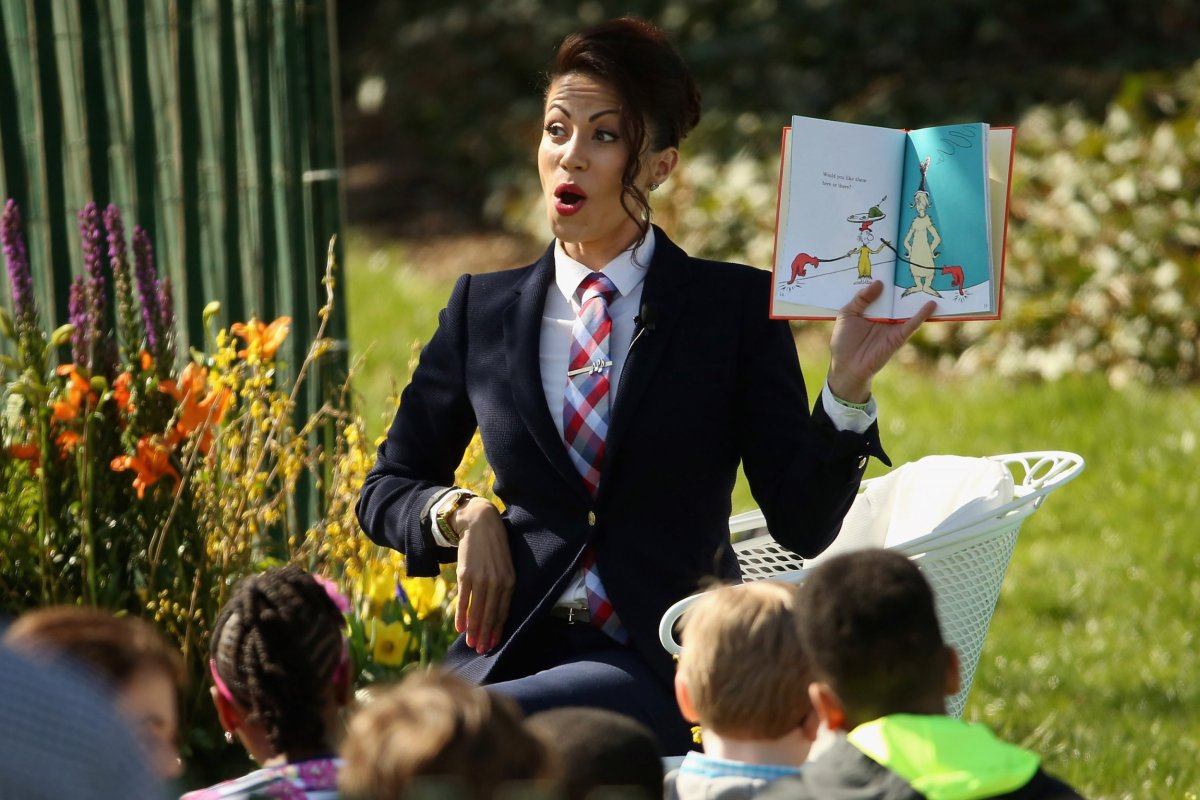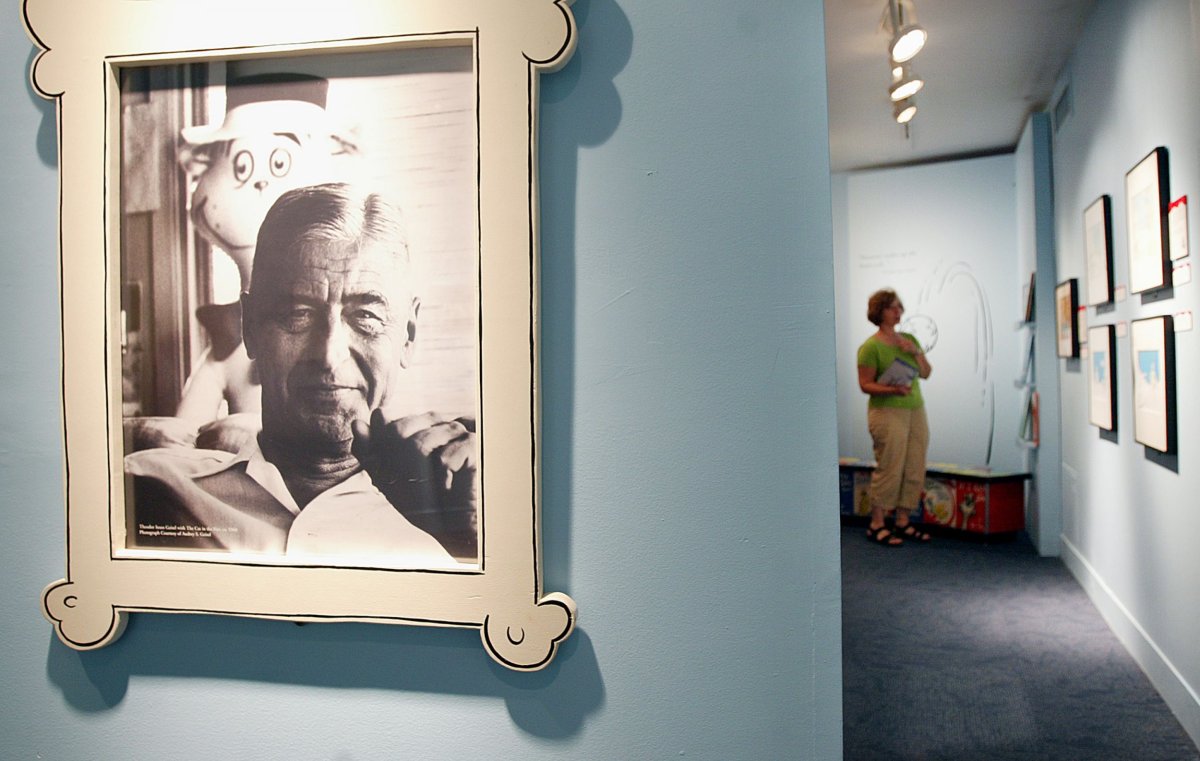"Do you like green eggs and ham?"
It's a seemingly innocuous question—and one that children and parents around the world will be affectionately familiar with as the first line of Dr. Seuss' beloved Green Eggs and Ham children's book.
First published on August 12, 1960, Green Eggs and Ham follows a particularly persistent character, "Sam-I-Am," who pesters another character, who is never named in the tale, to try a plate of green eggs and ham, despite the second character's repeated refusals.

After being hounded by the determined Sam-I-Am across several locations, including in a car, on a train and on a boat in the middle of the ocean, the second character finally relents, agreeing to give green eggs and ham a chance.
The story is supposed to be one about persistence, about trying new things.
But one middle school teacher says the tale could also be interpreted in a more negative way—and could have an important lesson to teach us about consent.
"I had been thinking about this ever since I read the book to my daughter who is now five," Mike Fishback, a San Diego humanities teacher, told Newsweek.
"Every time I read the book I think about how this is a really bad example of how to have relations with people," he said. "Then it occurred to me that now, in the context of the MeToo era, this could really be interpreted as a story about lack of consent."
Fishback said that Sam-I-Am's repeated badgering of the second character, demanding that they try "green eggs and ham," despite their refusals, could be seen as a form of harassment.

"If someone says 'no,' you do not persist and badger them until they break down and say yes", the teacher said.
"When the second character at the end of the book says, 'ok, Sam-I-Am, I'll try it,' he's not saying he's trying it because he's changed his mind. He's doing it because he's exhausted, tired, worn down and trapped," Fishback said.
Fishback said he had initially wanted to teach his seventh grade class of 12- and 13-year-old students about how they could use storytelling to support an argument.
A week or so before delivering the lesson, in the context of an unrelated class activity, Fishback lightheartedly referred to his dislike of Green Eggs and Ham, which prompted significant pushback from the class.
"Many students identified this as having been one of the first books they had loved as children, and the importance of the lesson that you should be open to trying new things," he said. "Simply telling them a different interpretation wasn't going to help them understand. That's when I realized that I could use this as a model for how they can use storytelling to shift people's thinking about something."
So a few days later, Fishback read the book aloud to the class and listened as students shared their mostly positive thoughts about it with one another.
"The class period ended with students feeling pretty good about having communicated to me what was so great about this book," he said, adding that he felt confident he had set the stage well for the next lesson on modeling storytelling.
Then coincidentally, on the day the seventh-grade teacher decided to teach his lesson and see if he could show his students another side to the Green Eggs and Ham story, much of the world was looking towards Washington, D.C. where senators had gathered to hear the testimonies of Supreme Court nominee Brett Kavanaugh and Palo Alto University Professor Christine Blasey Ford who had accused the judge of sexually assaulting her at a high school party in 1982.
Fishback realized he had an opportunity to turn this simple storytelling lesson into both a current events lesson and a life-skills lesson about the importance of consent.

Fishback said many of his students had been aware of the Kavanaugh story and had been following it.
However, the teacher said that regardless of whether his students were aware of the details of the allegations against Kavanaugh, he decided to focus the lesson specifically on consent and sexual harassment with the guidance of his school's principal.
"I want to emphasize that if teachers would like to pick this up and use Green Eggs and Ham to teach about consent, that it's really important to be careful about how you speak about sexual harassment and sexual assault because we don't want to trigger any students," he said.
As such, Fishback did not discuss the full details of the allegations against Kavanaugh.
Instead, he decided to tell them about attorney Anita Hill who testified before the Senate Judiciary Committee 27 years ago after accusing Judge Clarence Thomas of sexual harassment during his own confirmation hearings in 1991.
The teacher then defined sexual harassment, referred to the new round of Senate hearings happening "at this very hour," and proceeded to read aloud five real-life narratives of sexual harassment as told by working women to various media outlets during the past year of the MeToo movement.
"Then I told the class that when I, as a man, read stories like this from women, it makes me angry. These stories of being chased, their polite 'No's being ignored, of feeling trapped and having to escape, are experiences no one should ever have to go through. As a parent, I would never want my children, especially my son, to think this is okay."
Then, in a "slow and intense voice," Fishback said he told his students: "This is why I don't like the book Green Eggs and Ham.
"There was an audible gasp in the classroom," the teacher said.
Fishback said that after listening to stories of what sexual harassment looks like, the connection between harassment and Green Eggs and Ham seemed to click immediately.
"What I really wanted to focus on is that 'no means no'," he said. "We should be teaching kids how to listen to the word 'no" and to take it seriously and step back."
Books like Green Eggs and Ham, Fishback said, can be used as a teaching tool to start those important conversations.
"Many teachers use picture books with older students as a way of showing how stories can communicate a lesson or message," he said. "The 'hook' here is that I'm turning a beloved book on its head and revealing a hidden message that the author had not intended to teach. This gets the kids really engaged.
"Then, we can have conversations about serious issues on a deeper level because they have a prior story that they can reference-and that really is the power of using these picture books," Fishback said.
"You can still love this book," he said. "But what I hope is that when you think about this book, you will consider this angle too."
Uncommon Knowledge
Newsweek is committed to challenging conventional wisdom and finding connections in the search for common ground.
Newsweek is committed to challenging conventional wisdom and finding connections in the search for common ground.
About the writer
Chantal Da Silva is Chief Correspondent at Newsweek, with a focus on immigration and human rights. She is a Canadian-British journalist whose work ... Read more
To read how Newsweek uses AI as a newsroom tool, Click here.








